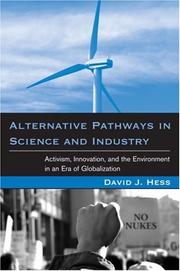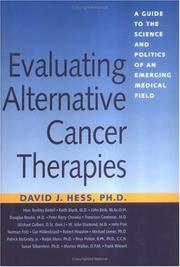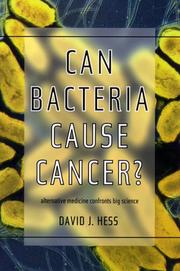| Listing 1 - 6 of 6 |
Sort by
|

ISBN: 0262083590 9786612098437 0262275325 1282098438 142946562X 9780262275323 9781429465625 9780262083591 9780262582728 0262582724 9781282098435 6612098430 Year: 2007 Publisher: Cambridge, Mass. : MIT Press,
Abstract | Keywords | Export | Availability | Bookmark
 Loading...
Loading...Choose an application
- Reference Manager
- EndNote
- RefWorks (Direct export to RefWorks)
In Alternative Pathways in Science and Industry, David Hess examines how social movements and other forms of activism affect innovation in science, technology, and industry. Synthesizing and extending work in social studies of science and technology, social movements, and globalization, Hess explores the interaction of grassroots environmental action and mainstream industry and offers a conceptual framework for understanding it. Hess proposes a theory of scientific and technological change that considers the roles that both industry and grassroots consumers play in setting the research agenda in science and technology, and he identifies "alternative pathways" by which social movements can influence scientific and technological innovation. He analyzes four of these pathways: industrial opposition movements, organized against targeted technologies (as in the campaign against nuclear energy); technology- and product-oriented movements, which press for alternatives (as does the organic food movement); localism, which promotes local ownership (as in "buy-local" campaigns); and access pathways, which support a more equitable distribution of resources. Within each pathway, Hess examines reforms in five different areas: agriculture, energy, waste and manufacturing, infrastructure, and finance. The book's theoretical argument and empirical evidence demonstrate the complex pattern of incorporation (of grassroots innovations) and transformation (of alternative ownership structures and the alternative products themselves) that has characterized the relationship of industry and activism. Hess's analysis of alternative pathways to change suggests ways economic organizations could shift to a more just and sustainable course in the twenty-first century.
Science --- Technology --- Science and industry. --- Social aspects. --- Industry and science --- Science and society --- Sociology of science --- Industries --- ENVIRONMENT/Environmental Politics & Policy
Book
ISBN: 0262012642 9786612240393 0262255480 1282240390 9780262255486 9780262012645 9780262512329 0262512327 9781282240391 6612240393 Year: 2009 Publisher: Cambridge, Mass. : MIT Press,
Abstract | Keywords | Export | Availability | Bookmark
 Loading...
Loading...Choose an application
- Reference Manager
- EndNote
- RefWorks (Direct export to RefWorks)
David J. Hess presents an overview of the localist movement in the United States, from 'buy local' campaigns to urban agriculture, and its potential for addressing global problems of sustainability and justice.
Sustainable urban development --- Globalization --- Central-local government relations --- Economic History --- Business & Economics --- Globalization. --- Central-local government relations. --- Center-periphery government relations --- Local-central government relations --- Local government-central government relations --- Global cities --- Globalisation --- Internationalization --- Environmentally sustainable urban development --- Political science --- Decentralization in government --- Federal government --- International relations --- Anti-globalization movement --- City planning --- Sustainable development --- ENVIRONMENT/Environmental Politics & Policy --- ARCHITECTURE/Urban Design --- Sociology of environment --- Community organization --- United States --- #SBIB:324H74 --- #SBIB:33H072 --- Politieke verandering: sociale bewegingen --- Wereldmarkten --- United States of America

ISBN: 0813568358 0585039216 9780585039213 0813525942 9780813568355 Year: 1999 Publisher: [Place of publication not identified] Rutgers University Press
Abstract | Keywords | Export | Availability | Bookmark
 Loading...
Loading...Choose an application
- Reference Manager
- EndNote
- RefWorks (Direct export to RefWorks)
Cancer --- Complementary Therapies. --- Neoplasms --- Treatment Outcome. --- Clinical Effectiveness --- Clinical Efficacy --- Patient-Relevant Outcome --- Treatment Efficacy --- Rehabilitation Outcome --- Treatment Effectiveness --- Effectiveness, Clinical --- Effectiveness, Treatment --- Efficacy, Clinical --- Efficacy, Treatment --- Outcome, Patient-Relevant --- Outcome, Rehabilitation --- Outcome, Treatment --- Outcomes, Patient-Relevant --- Patient Relevant Outcome --- Patient-Relevant Outcomes --- Lysholm Knee Score --- Alternative Therapies --- Therapy, Alternative --- Therapy, Complementary --- Alternative Medicine --- Complementary Medicine --- Medicine, Alternative --- Medicine, Complementary --- Therapies, Alternative --- Therapies, Complementary --- Alternative treatment --- therapy. --- Alternative therapy --- Treatment --- National Institutes of Health (U.S.)

ISBN: 0585321124 9780585321127 0814735614 9780814735619 0814735622 9780814735626 9780814744833 0814744834 Year: 1997 Publisher: New York New York University Press
Abstract | Keywords | Export | Availability | Bookmark
 Loading...
Loading...Choose an application
- Reference Manager
- EndNote
- RefWorks (Direct export to RefWorks)
Growing numbers of cancer patients are exploring diet, food supplements, herbs, and nontoxic immunotherapies like bacterial vaccines as a means of therapy. Yet most cancer research organizations refuse to even evaluate these alternatives. Can Bacteria Cause Cancer? argues convincingly that unless this neglected world of alternative therapies is properly scrutinized, the medical Vietnam of the twentieth century may well affect one in two people by the twenty-first century.David J. Hess investigates one of the great medical mysteries of the twentieth century--the relationship between bacteria and chronic disease. Recently scientists have overturned long-held beliefs by demonstrating that bacterial infections cause many ulcers; they are now reconsidering the role of bacterial infections in other chronic diseases, such as arthritis. Is it possible, Hess asks, that bacteria can contribute to the many other known causes of cancer?To answer this intriguing question, Hess takes us into the world of alternative cancer researchers. Maintaining that their work has been actively suppressed rather than simply dismissed, he examines their claims---that bacterial vaccines have led to some dramatic cases of long-term cancer remission--and the scientific potential of their theories. Economic interests and cultural values, he demonstrates, have influenced the rush toward radiation and chemotherapy and the current cul-de-sac of toxic treatments.More than a medical mystery story, Can Bacteria Cause Cancer? is a dramatic case study of the failure of the war on cancer.
Carcinogenesis --- Cancer --- Bacterial Diseases --- Alternative Medicine --- Medical --- Bacterial diseases --- Alternative medicine
Book
ISBN: 0262336448 9780262336444 9780262336420 0262336421 9780262035132 0262035138 9780262529495 0262529491 026233643X Year: 2017 Publisher: Cammbridge : MIT Press,
Abstract | Keywords | Export | Availability | Bookmark
 Loading...
Loading...Choose an application
- Reference Manager
- EndNote
- RefWorks (Direct export to RefWorks)
As the fields of social movement studies (SMS) and science and technology studies (STS) have diversified in topical focus, they have moved closer to each other. SMS has turned toward the study of nonstate targets and institutionalized repertoires of action, just as STS has turned to expertise and publics. In Undone Science, David Hess argues that a theoretical integration of core concepts in the two fields is now possible, and he presents just such a synthesis. Hess focuses on industrial transition movements-mobilized counterpublics of activists, advocates, entrepreneurs, and other agents of change-and examines several areas of common ground between the two fields relevant to these movements. His account reveals the problem of "undone science"-areas of research potentially valuable to the goals of industrial transition movements that have been systematically ignored.Each chapter begins with a problem in SMS, discusses the relevant STS literature, describes new concepts and findings that have emerged, and offers applications to examples that range from nanotechnology and climate science denialism to conflicts based on race, class, and gender. Topics include the epistemic dimension of the political opportunity structure, networks of counterpublic knowledge, and regime resistance in industrial transition.
Political participation. --- Social movements. --- Industries --- Science and industry --- Technology --- Science --- Science and society --- Sociology of science --- Industry and science --- Industrial production --- Industry --- Economics --- Movements, Social --- Social history --- Social psychology --- Citizen participation --- Community action --- Community involvement --- Community participation --- Involvement, Community --- Mass political behavior --- Participation, Citizen --- Participation, Community --- Participation, Political --- Political activity --- Political behavior --- Political rights --- Social participation --- Political activists --- Politics, Practical --- Technological innovations --- Social aspects. --- Social movements --- Political participation --- Sciences --- Social aspects --- Aspect social. --- Industries, Primitive
Book
ISBN: 1783506679 1783506687 1322081700 9781783506675 9781322081700 9781783506682 Year: 2014 Publisher: Bingley, England : Emerald,
Abstract | Keywords | Export | Availability | Bookmark
 Loading...
Loading...Choose an application
- Reference Manager
- EndNote
- RefWorks (Direct export to RefWorks)
This issue of Political power and social theory explores the changes in science associated with the rise of neoliberalism since the 1970s. The neoliberalization of science has complicated interactions among states, markets, and civil society, often in ways that challenge major assumptions underlying decades of research. The articles collected here break with older Mertonian sociologies of science and constructivist micro-sociologies of scientific knowledge to examine the meso-level problem of the changing institutional contexts of the scientific field as originally identified by Pierre Bourdieu. Papers presented in Part I extend Bourdieús relational approach to the broader set of interactions among scientific, regulatory, industry, and social movement fields. Part II extends Bourdieu's concern with order and the scientific habitus to the changing patterns of scientific practices under neoliberalism. By reconceptualizing the central problem for the social studies of science as the political sociological problem of field and inter-field dynamics, the collected papers chart an important theoretical agenda for future research in the study of science-society relations.
Comparative government. --- International relations --- Neoliberalism. --- Methodology. --- Neo-liberalism --- Comparative political systems --- Comparative politics --- Government, Comparative --- Political systems, Comparative --- International relations -- Methodology. --- Political science -- Philosophy. --- Political science. --- Physical Sciences & Mathematics --- Sciences - General --- Liberalism --- Political science --- Political Science --- Political science & theory. --- Political ideologies. --- Society & social sciences. --- Science and state --- Science --- Pesticides. --- Climatology. --- Nutrition. --- Hydraulic fracturing. --- General. --- Social aspects. --- Fracking (Engineering) --- Fracturing, Hydraulic --- Hydrofracking --- Hydraulic engineering --- Rock mechanics --- Alimentation --- Food --- Nutrition --- Health --- Physiology --- Diet --- Dietetics --- Digestion --- Food habits --- Malnutrition --- Climate --- Climate science --- Climate sciences --- Science of climate --- Atmospheric science --- Economic poisons --- Agricultural chemicals --- Pests --- Poisons --- Administration --- Civil government --- Commonwealth, The --- Government --- Political theory --- Political thought --- Politics --- Science, Political --- Social sciences --- State, The --- Science and society --- Sociology of science --- Science policy --- State and science --- Health aspects --- Control --- Equipment and supplies --- Government policy
| Listing 1 - 6 of 6 |
Sort by
|

 Search
Search Feedback
Feedback About
About Help
Help News
News